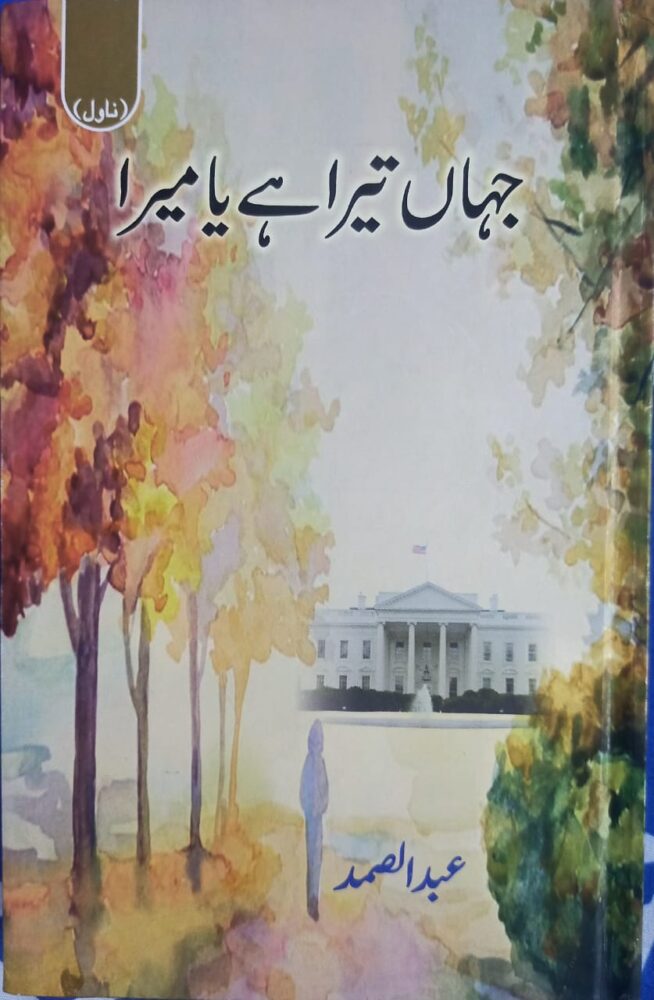“Beshak raushni ko Mehmood nhi kiya ja sakta.”
(Undoubtedly, the light can’t be restricted)
Jahan Tera Hai Ya Mera, is a book that revolves around the life of a young Muslim boy who finds himself at the crossroads of life. Abdus Samad, the author of the book, has in his novel touched upon some of the finer emotional and social turmoil that a Muslim boy has to undergo in the complex society where a person’s religion matters. The author tries to depict the problems faced by a Muslim boy Rashid, who dreams of making it big like any other aspiring youth.
Abdus Samad deserves all the appreciation for creating such a riveting story. The novel delves into the hardships coupled with despairs, dejection, dreams and desires of a young Muslim boy to make his presence felt in a multi-cultural, and multi-religious society. As another middle-class aspirant boy, more so, from the Muslim community, Rashid, dreams to make it big in life through higher education. Nevertheless, he comes close to realising his dream of attaining higher education with sheer grit and dedication. But little does he realise about the odds that are stacked against him, post-education. And, the challenge would be that of finding a job in a multi-cultural society. His relentless search for a decent job remains a distant dream. Though he comes across many but none of his choice. However, he gets an offer from a minority institution as a teacher. But here too the fate has something else in store for him. He can be made permanent only if he decides to marry the daughter of the Manager of that institution, which for him becomes a reason for leaving the job.

The author Abdus Samad, by highlighting the ‘conditional job’, makes an attempt to bring forth the workplace harassment that has to be faced by even a male employee, leave alone a woman worker.
However, as the old saying goes, that God opens another door if he closes one, Rashid gets an appointment as a draft writer at a private company. But his joy does not last long, and he has to quit the job owing to religious discrimination.
Rashid, being a Muslim, has to face the wrath after a terrorist attack that happens in some other parts of the country. The community, in general, had to face the wrath, and so does Rashid, who eventually has to leave the job.
Abdus Samad has very aptly touched the issues faced by the Muslim community in their own homeland. He presents the issue of discrimination in the name of religion, along with the other related issues like poverty, unemployment, low education rate etc. Being a Muslim becomes a felony in certain situations not only in India but in other parts of the world too.
After having tried his luck within the country, the dejected Rashid decides to try his luck in the USA with the help of his uncle, Qadeer. While his uncle helps him with a job, life in America too is stacked with all kinds of odds. To much of his dismay, Rashid discovers that the attitude of the world towards Muslims is more or less the same everywhere.
Though America is a developed country and a land of ‘so-called’ open-minded people, yet the heart-rending incident of 9/11 has made them suspicious towards the entire Muslim community.
While Rashid learns many new things about life, at the same time, he loses some old ties too. His stay in America is extended. Meanwhile, the girl whom Rashid loved-Afreen-gets married to someone else. His love story is not a typical kind, but surely involves Rashid’s roller-coaster ride of emotions.
This loss breaks him apart and he realizes the futility of being away from one’s home. During his stay in America, Rashid meets a Professor whose knowledgeable talks enlighten him. I believe the character of the Professor has been introduced because of the author’s drive to pack the novel with discussions and descriptions of the issues and problems that the Muslim community is facing but is not trying to overcome.
As the Professor says, “Darasal ab kuch karne ka waqt bohot pehle khatm ho chuka hai.” (Time for making amends has already passed), when he is asked to suggest any solution for the mammoth problems of the Muslim community around the world. After completing his contract, Rashid returns to India with the same feeling of dejection.
The novelist has very poignantly dealt with the issues of work-place exploitation, religious discrimination, domestic violence and the emptiness of life. It leaves the readers to realize the true aim of their lives and strive for its achievement. The journey of finding one’s true destination is not always easy but it, indeed, opens up new directions to be explored.
This book is worth a read.
Though the novel is not a very fast-paced book, it provides some crackerjack details of the lives of a docile Muslim boy. It is expository in a manner with no suspense. The novelist doesn’t leave much to the readers’ speculations. Rashid comes to India after his work contract expires in the USA. However, his suffering does not end here, and the moment he lands at the airport, he brings back his phone to life, only to learn that his Professor has passed away.
Abdus Samad ends the story with a message that this life is uncertain and the priorities that we set for it, sometimes take us away from the real objective of life. However, there is always a ray of hope in everything which keeps us all going: “Beshak raushni ko mehdood nhi kiya ja sakta.”
Dr Sadaf Fareed is an Asst. Professor in Dept. of English, Women’s College, Aligarh Muslim University.
“. . . and let them pardon and overlook. Would you not like that Allah should forgive you? And Allah is Forgiving and Merciful.” [Quran 24:22]








